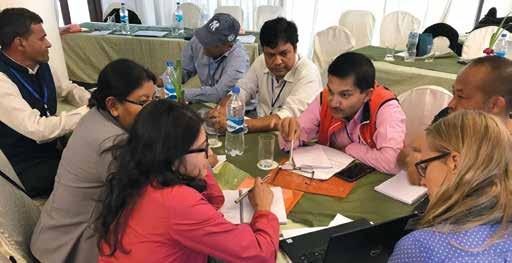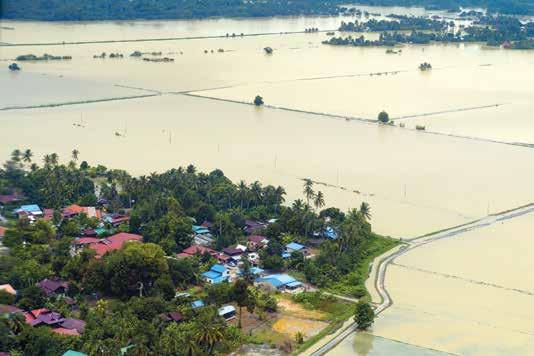
3 minute read
GWP around the world: 2019 highlights
CARIBBEAN
108 Partners, 24 countries Capacity-building conducted for developing climate resilience proposals (page 23) New SDG 6 monitoring guide for small island states produced (page 24)
Advertisement
CENTRAL AND EASTERN EUROPE
CENTRAL AMERICA
223 Partners, 7 countries Public policy document produced for a regional dialogue on transboundary waters (page 25) Work plan developed for interinstitutional commission on SDG 6.5.1 in Nicaragua (page 24)
SOUTH AMERICA
371 Partners, 10 countries Regional initiative created to promote better anticipatory water governance (page 26) Collaboration established on building climate-resilient water resources in Uruguay (page 26)
190 Partners, 12 countries Funding secured for Slovakia’s drought plan (page 30) Drought preparation strategy for the Danube river basin launched (page 30)
MEDITERRANEAN
94 Partners, 25 countries Strategic action programme launched for the transboundary Drin river basin (page 29) Regional dialogue held on transboundary North-Western Sahara Aquifer system (page 30)
WEST AFRICA
241 Partners, 15 countries Road map for SDG 6 implementation agreed in
Ghana (page 12) Water charter for the
Volta basin approved at ministerial level (page 12)
CENTRAL AFRICA
178 Partners, 7 countries Funding mobilised for a regional hydrometeorological strategy (page 10) Youth voices acknowledged in preparations for the 2021 World Water Forum (page 10)
CAUCASUS AND CENTRAL ASIA 146 Partners, 9 countries Draft national action plan on SDG 6.5.1 agreed in Kazakhstan (page 15) Regional knowledgeexchange opportunities created for students (page 15)
SOUTH ASIA
406 Partners, 7 countries New youth water fellowship programme created in India (page 17) GWP appointed as GCF
Readiness Delivery Partner for Sri Lanka (page 17)
EASTERN AFRICA
303 Partners, 10 countries Funding secured for drought resilience in the Horn of Africa (page 10)
SOUTHERN AFRICA
342 Partners, 13 countries Agreement on water cooperation signed by Mozambique and
Zimbabwe (page 11) Cooperation framework established on water, energy, and food (page 11)
CHINA
99 Partners Water tax reform actioned in nine provinces (page 16) Draft law agreed on water resources management for the Yangtze basin (page 16)
SOUTHEAST ASIA
264 Partners, 10 countries Climate resilience promotion activities conducted in Malaysia (page 20)
GLOBAL
297 Partners, 33 countries GWP supported planning and implementation of SDG 6 activities in more than ten countries (page 13) GWP approved as official delivery partner for countries to access climate finance from the GCF (page 21)
Water management strategy for the Kamala River basin, Nepal GWP Nepal supported a range of activities in 2019 that culminated in the drafting of a management strategy for the Kamala River basin. These included preparing a stakeholder engagement plan, and collecting and analysing data on the river system, climate, natural resources, and socioeconomic factors. The basin development goals were also identified and discussed with local stakeholders, with their feedback helping to prioritise the principal goals and actions. The strategy, which is designed to achieve the vision of an economically prosperous, socially just, and environmentally sound river basin, is currently under review and is likely to be launched in 2020.
I n f u e n c e O u t c o m e O u t p u t I m p a c t
Change process
Knowledge
Partnerships
Stakeholders hold discussions on the Kamala River basin water management strategy, Nepal
SOUTHEAST ASIA
Developing resilience to flooding in Malaysia Around 10 percent of the land area of Malaysia is flood-prone. This puts a potential 5.5 million people at risk of damage to their lives, property, and livelihoods. With climate change likely to increase the frequency of extreme rainfall, preparation is key. To improve capacity for flood preparedness, in 2019 GWP Malaysia and partners hosted a demonstration project and stakeholder event on integrated flood management. The objectives included educating government agencies, raising awareness among local communities by introducing hazard mapping, and strengthening networks and platforms to share knowledge and information. With a key focus on community empowerment in preparation and response to flooding events, the initiative is well placed to catalyse change, and will be replicated in additional areas in the future.
I n f u e n c e O u t c o m e O u t p u t I m p a c t
Change process
Knowledge
Partnerships
Flooding in Pulau Pinang, Malaysia, in 2017










